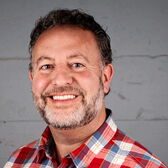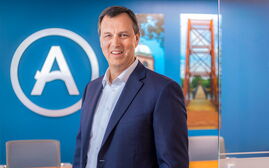
Processing Your Payment
Please do not leave this page until complete. This can take a few moments.
Business with a purpose: Maine financial firms join growing ‘conscious capitalism’ movement
 Photo / Jim Neuger
Tara Jenkins, founder of the Portland Conscious Capitalism Community, leading one of the group’s monthly meetings, at Rising Tide Brewing Co., in March, just before “social distancing” became commonplace.
Photo / Jim Neuger
Tara Jenkins, founder of the Portland Conscious Capitalism Community, leading one of the group’s monthly meetings, at Rising Tide Brewing Co., in March, just before “social distancing” became commonplace.
Once a month in Portland, members of the city’s business community meet to talk about business — and capitalism — as a force for good.
The Portland Conscious Capitalism Community, as the group is known, is part of a growing national movement that puts purpose on a par with profit. It’s grown from a few people last August to about 50 today, representing a wide range of industries and professional backgrounds.
At every meeting, founder Tara Jenkins displays hand-written posters around the room listing the four tenets of conscious capitalism — higher purpose, conscious leadership, caring culture and stakeholder orientation. Another lists the five stages of conscious companies from “bad actor” to “conscious business.”

That approach is about to face its biggest test as the coronavirus outbreak rattles global markets and companies, threatening more damage than the 2008 meltdown. Yet in the midst of all the chaos and uncertainty, might this be conscious capitalism’s time to shine?
“Absolutely,” says Steve Tenney, founder and CEO of Great Diamond Partners, a Portland-based wealth management firm. “Now it’s even more important. Emerging and critical needs, like feeding our neighbors, need to be addressed. It’s easy to commit to help others when times are good. However, thoughtful and targeted efforts have an even greater impact on our community in a challenging environment.”
To a certain extent, Tenney says the challenge begins when the economic climate is good. “That’s when companies need fiscal discipline, creative solutions and targeted efforts. Continuing that during a downturn is simply a continuation of the discipline and philosophy.”
A regular at Portland Conscious Capitalism Community monthly get-togethers, Tenney runs his boutique firm along the same principles — basing all decisions on the interests not just of the owners or shareholders but also its clients, employees, strategic partners, the community and the environment.
“Everything we do, every decision we make, needs to take those six stakeholders into account,” he says in an interview at his office overlooking Monument Square. He recalls conscious capitalism first on his radar as he prepared to launch Great Diamond Partners because “we just felt there was a better way to run a business … It doesn’t mean that your business is weaker. In fact, the stronger the business, the more successful the business is, and the greater impact it can have on all the stakeholders.”
Examples of putting that into practice pre-date the crisis. They include giving staff generous paid time off, and basing investment decisions on environmental, social and governance considerations, Tenney says. “We’ve been implementing numerous ESG strategies for clients, and I don’t see any slowdown there.”
Among other Portland Conscious Capitalism Community members, Androscoggin Bank President and CEO Neil Kiely says the principles that resonate most with him are that companies do not exist solely to make profit, and the long-term balancing of different interests.
“The key, though, is authenticity,” Kiely says. “You cannot fake caring about your stakeholders to try to leverage the long-term results.”

He says he also believes that employees hold an outsized impact on any company’s success, adding: “At the end of the day, if you have great employees, you can trust them to make it happen.”
‘Movement is gaining speed’
Jenkins, who also has a consultancy called Conscious Revolution, joined the conscious business movement after a 25-year career in human resources.
She became a convert after leaving her job at IDEXX in December 2018, having lots of informal meetings and doing volunteer work to figure out her next move.
“That eventually led me to conscious business,” she says. “I could take what I loved about human resources...and bring it into this new paradigm shift for business. The movement is gaining speed.”
Seen through the lens of the ongoing public health crisis, Jenkins notes that conscious firms fare better in hard economic times than those focused only on profit. Suppliers, for example, will allow later payments or different pricing structures, as they don’t want their business partners to go under, and communities will want to see businesses they love alive.
She also points to numerous studies showing that conscious businesses outperform their peers in terms of earnings, revenue and stock market performance. One metric, in a 2016 study by LinkedIn and Imperative, shows revenue growth in 85% of purpose-led companies. At the other end of the spectrum, 42% of non-purpose led companies showed a drop in revenue.
“In the Conscious Business movement, we often talk about a reckoning for profit-maximizing businesses where they will have to change how they operate or go out of business,” she says. “We might see that reckoning play out during this economic downturn, where the companies that operate in the traditional profit-maximizing model don’t survive and the new definition of ‘survival of the fittest’ points to conscious businesses.”
From Wall Street to Main Street
Conscious capitalism was popularized by John Mackey, founder and CEO of grocery chain Whole Foods Market, and business educator Raj Sisoda, in a 2013 book entitled “Conscious Capitalism: Liberating the Heroic Spirit of Business.”
Arguing that business and capitalism are inherently good, they show how firms from Whole Foods to outdoor apparel-retailer Patagonia driven by a higher purpose and other values are thriving. They also have a national nonprofit, called Conscious Capitalism Inc., with chapters in 26 U.S. cities and some foreign countries, and a three-day online annual conference this month.
Though financial services providers are not traditionally known as do-gooders, an increasing number of banks are latching on to conscious capitalism, with JP Morgan Chase & Co. Chairman and CEO Jamie Dimon and BlackRock Inc. CEO Larry Fink among its biggest cheerleaders. As chairman of Washington, D.C.-based nonprofit Business Roundtable, Dimon led a pledge signed by 181 CEOs last August redefining the purpose of a corporation “to promote an economy to serve all Americans.”
In Maine, that same spirit was in evidence on a rainy Friday the 13th — March 13 to be exact, the same week the World Health Organization deemed coronavirus as a global pandemic, Maine reported its first case of COVID-19 and employers began taking precautions.
That morning, around 50 business people gathered in a conference room at Rising Tide Brewing in Portland’s East Bayside neighborhood to hear Kevin Hancock, chairman and CEO of Hancock Lumber Co., talk about his leadership journey and his latest book, “The Seventh Power.”

Broadening his inspirational message to the crisis at hand, Hancock said the response to the pandemic requires the participation of “everybody on earth, on a global scale.”
Hancock, who also spoke of the importance of humility and the leadership power of nature that lives within each of us, “has not only been talking the talk but walking the walk for the last decade,” says Todd Bachelder, Portland-based senior vice president and Maine market manager with Mascoma Bank, a mutually owned bank headquartered in Lebanon, N.H.
Mascoma Bank has about 350 employees and received B Corporation certification in 2017. That’s a stamp of approval for businesses that have been judged to meet the highest standards of verified social and environmental performance, public transparency and legal accountability to balance profit and purpose.
Besides attending Portland Conscious Capitalism Community meetings, Bachelder plans quarterly meetings for fellow B Corporations in Maine. Not surprisingly, the groups have a lot of overlaps.
For Mascoma, being a B Corp has “been a wonderful way to recruit, attract and retain employees,” Bachelder says. “The younger generation is very much attuned to mission-driven businesses, and there’s no doubt we’ve been able to maintain greater commitment and enthusiasm among the whole team.”














0 Comments